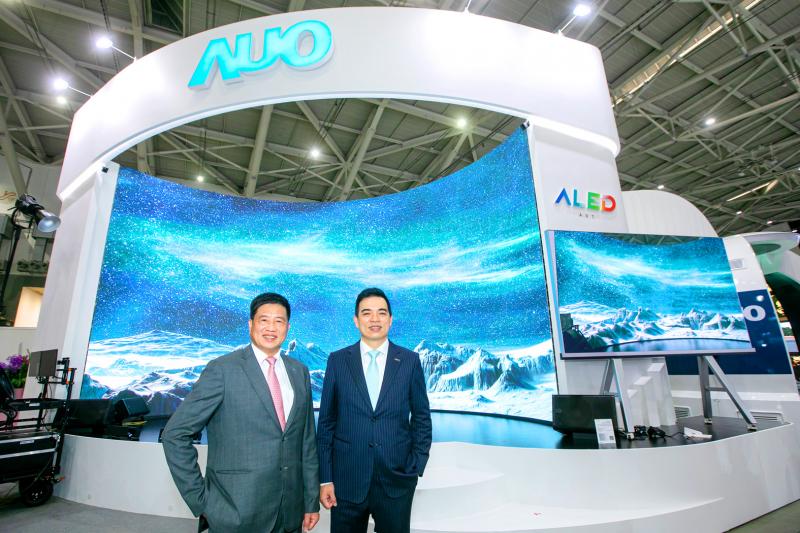AUO Corp (友達) yesterday cut capital spending by 20 percent to NT$36 billion (US$1.2 billion) this year from NT$45 billion, and suspended the construction of a new 8.5-generation production line in central Taiwan to cope with a severe downcycle after the LCD panel maker last quarter posted its first loss in about two years.
The slump in the industry and the weakness of AUO’s financial results reflect macroeconomic headwinds, including China’s COVID-19 lockdowns, Russia’s invasion of Ukraine, energy supply constraints and soaring inflation, the company said.
Additionally, the global economy is faced with a potential recession following a series of interest rate hikes, it said.

Photo courtesy of AUO Corp
“The latest downcycle came abruptly and exerted a broader impact,” AUO chairman and CEO Paul Peng (彭双浪) said at a teleconference yesterday.
“International factors have weighed on demand and we have difficulties controlling those external factors,” he said.
Previous downturns were caused by panel oversupply, but this one is much different, as an unfavorable macroenvironment has crippled consumers’ purchasing power and depressed demand for TVs, PCs and smartphones, he said, adding that recovery to normal levels is expected over an extended period.
“Clients are cutting orders and slowing down pulling in delivery as they prioritize efforts to digest excessive inventory,” Peng said.
With adverse conditions expected to last for a while, the company is slowing its capacity expansion and strictly managing inventory, he said.
AUO expects shipments to shrink about 15 percent quarterly this quarter, while it aims to keep average selling prices stable by improving its product offerings, Peng said.
Prices tumbled 13.63 percent quarterly and 23.83 percent annually to US$374 per square meter last quarter, he added.
The company also plans to adjust factory utilization, which stood at 70 percent last quarter, to counter market volatility this quarter, he said.
AUO incurred net losses of NT$5.63 billion last quarter, the first loss since the second quarter of 2020. It reported net profit of NT$5.16 billion in the previous quarter and NT$19.54 billion a year earlier.
Shipments shrank 18.7 percent sequentially and 23.2 percent annually to 4.92 million square meters last quarter, while gross margin fell to 2.7 percent, from 14.3 percent in the preceding quarter and 28.7 percent a year earlier.
Local rival Innolux Corp (群創) also drifted into the red with losses of NT$4.74 billion last quarter, the company reported yesterday.
It posted net profit of NT$1.89 billion in the first quarter and NT$21.42 billion a year earlier.
Gross margin plunged to 1.2 percent last quarter from 12.3 percent in the previous quarter and 33.1 percent a year earlier.
Innolux said shipments of TV and PC panels this quarter are expected to be flat from last quarter.
Average selling prices are expected to drop by a high single-digit percentage this quarter, while shipments of small and medium-sized panels are expected to plunge about 18 percent from last quarter, the company said.

PATENTS: MediaTek Inc said it would not comment on ongoing legal cases, but does not expect the legal action by Huawei to affect its business operations Smartphone integrated chips designer MediaTek Inc (聯發科) on Friday said that a lawsuit filed by Chinese smartphone brand Huawei Technologies Co (華為) over alleged patent infringements would have little impact on its operations. In an announcement posted on the Taiwan Stock Exchange, MediaTek said that it would not comment on an ongoing legal case. However, the company said that Huawei’s legal action would have little impact on its operations. MediaTek’s statement came after China-based PRIP Research said on Thursday that Huawei filed a lawsuit with a Chinese district court claiming that MediaTek infringed on its patents. The infringement mentioned in the lawsuit likely involved

Taipei is today suspending work, classes and its US$2.4 trillion stock market as Typhoon Gaemi approaches Taiwan with strong winds and heavy rain. The nation is not conducting securities, currency or fixed income trading, statements from its stock and currency exchanges said. Authorities had yesterday issued a warning that the storm could affect people on land and canceled some ship crossings and domestic flights. Taiwan Semiconductor Manufacturing Co (TSMC, 台積電) expects its local chipmaking fabs to maintain normal production, the company said in an e-mailed statement. The main chipmaker for Apple Inc and Nvidia Corp said it has activated routine typhoon alert

GROWTH: TSMC increased its projected revenue growth for this year to more than 25 percent, citing stronger-than-expected demand for AI devices and smartphones The Taiwan Institute of Economic Research (TIER, 台灣經濟研究院) yesterday raised its forecast for Taiwan’s GDP growth this year from 3.29 percent to 3.85 percent, as exports and private investment recovered faster than it predicted three months ago. The Taipei-based think tank also expects that Taiwan would see a 8.19 percent increase in exports this year, better than the 7.55 percent it projected in April, as US technology giants spent more money on artificial intelligence (AI) infrastructure and development. “There will be more AI servers going forward, but it remains to be seen if the momentum would extend to personal computers, smartphones and

Catastrophic computer outages caused by a software update from one company have once again exposed the dangers of global technological dependence on a handful of players, experts said on Friday. A flawed update sent out by the little-known security firm CrowdStrike Holdings Inc brought airlines, TV stations and myriad other aspects of daily life to a standstill. The outages affected companies or individuals that use CrowdStrike on the Microsoft Inc’s Windows platform. When they applied the update, the incompatible software crashed computers into a frozen state known as the “blue screen of death.” “Today CrowdStrike has become a household name, but not in